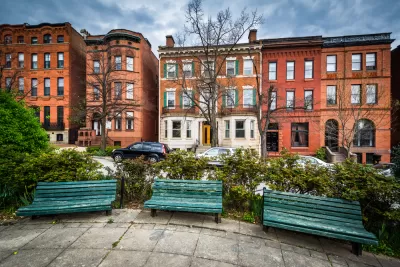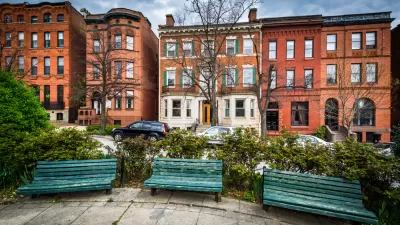The decision by the Baltimore County Council allows landlords to continue using "source of income" as criteria for prospective tenants. Such practices are often used to bar residents relying on housing vouchers.

"The Baltimore County Council rejected a bill Monday that would have made it illegal for landlords to discriminate against prospective tenants who use government housing vouchers to pay their rent," reports Pamela Wood.
"The council was required to consider the bill as part of a settlement of a housing discrimination complaint negotiated between the county government and the U.S. Department of Housing and Urban Development. Members voted 6-1 against it," adds Wood.
Wood details both sides of the political debate over the bill, which culminated this week after an "impassioned" public process last month. Wood shares talking points and arguments made by many of the politicians responsible for the bill's demise.
The news of the bill's failure also made the round on websites familiar to Planetizen readers, including an article on the Washington Post's Wonkblog, by Emily Badger. Badger writes that the bill's failure continues the tradition of legalized discrimination enabled by "source of income" criteria.
"Because this kind of discrimination is broadly accepted, the federal government’s largest housing program for the poor doesn’t work like it should," writes Badger. "Families with vouchers designed for the private market find much of the private market closed to them."
Jen Kinney also summarizes the news for a post on Next City. Kinney concludes by noting that "the county is required to take up the bill again after the next county elections in 2018."
FULL STORY: Baltimore County Council rejects housing anti-discrimination bill

Alabama: Trump Terminates Settlements for Black Communities Harmed By Raw Sewage
Trump deemed the landmark civil rights agreement “illegal DEI and environmental justice policy.”

Planetizen Federal Action Tracker
A weekly monitor of how Trump’s orders and actions are impacting planners and planning in America.

Why Should We Subsidize Public Transportation?
Many public transit agencies face financial stress due to rising costs, declining fare revenue, and declining subsidies. Transit advocates must provide a strong business case for increasing public transit funding.

Understanding Road Diets
An explainer from Momentum highlights the advantages of reducing vehicle lanes in favor of more bike, transit, and pedestrian infrastructure.

New California Law Regulates Warehouse Pollution
A new law tightens building and emissions regulations for large distribution warehouses to mitigate air pollution and traffic in surrounding communities.

Phoenix Announces Opening Date for Light Rail Extension
The South Central extension will connect South Phoenix to downtown and other major hubs starting on June 7.
Urban Design for Planners 1: Software Tools
This six-course series explores essential urban design concepts using open source software and equips planners with the tools they need to participate fully in the urban design process.
Planning for Universal Design
Learn the tools for implementing Universal Design in planning regulations.
Caltrans
Smith Gee Studio
Institute for Housing and Urban Development Studies (IHS)
City of Grandview
Harvard GSD Executive Education
Toledo-Lucas County Plan Commissions
Salt Lake City
NYU Wagner Graduate School of Public Service





























